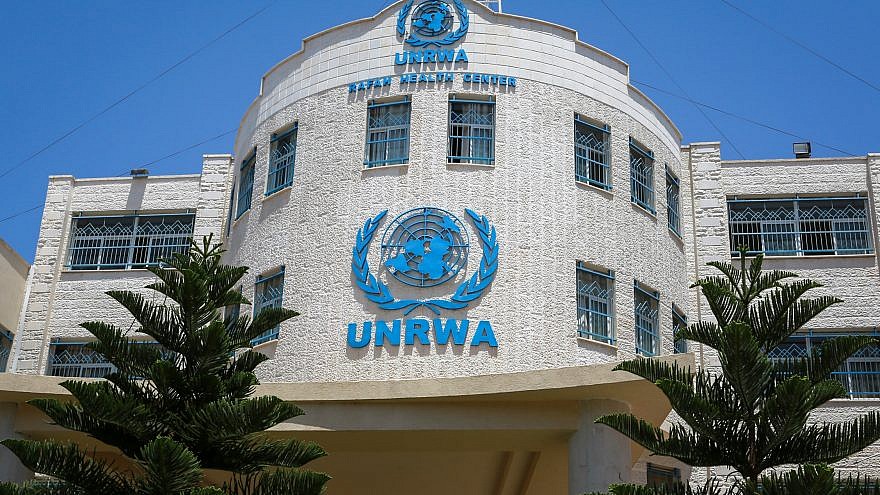IN THE MEDIA
Good Money after Bad: Why is Australia continuing to pour money into the UN’s refugee efforts in Palestine?
August 23, 2019 | Ahron Shapiro

The Netherlands, Switzerland and Belgium have recently suspended their contributions to the UN’s refugee agency dedicated exclusively for Palestinians – the United Nations Relief and Works Agency for Palestine Refugees in the Near East (UNRWA) – after a leaked report found UNRWA’s top management, including Commissioner-General Pierre Krahenbuhl, “engaged in sexual misconduct, nepotism, retaliation, discrimination and other abuses of authority.”
Australia, which is one of UNRWA’s largest donors per capita, should consider joining its European counterparts in suspending its $20 million annual contribution to the agency, and instead investigate other channels to deliver a core package of humanitarian aid services for those in need of food, shelter, medical care and education.
While the latest scandal alone justifies such action, in truth, corruption is only one of UNRWA’s problems crying out for reform.
These include publishing UNRWA school textbooks riddled with antisemitism and incitement to violence against Israelis; UNRWA employees posting incitement on their social media; and terrorists using UNRWA schools to store rockets in Gaza.
But these are merely symptoms of the larger problem of UNRWA’s highly politicised activities. Indifferent to their individual wishes, in practice, through its policies, UNRWA holds Palestinians hostage to an inculcated refugee existence.
For this reason, and others, the US stopped funding UNRWA last year. At that time, the US State Department called UNRWA an “irredeemably flawed operation” with an “endlessly and exponentially expanding community of entitled beneficiaries” – a reference to the organisation’s “unsustainable” policy of adding to its rolls every descendant of the original Palestinian refugees from the 1948 war, from here to eternity.
By contrast, the UN refugee agency (UNHCR) responsible for dealing with all other refugee populations does not bequeath refugee status to descendants of refugees. Moreover, the UNHCR works to ease refugee problems through a variety of measures, including resettlement. UNRWA not only won’t help Palestinians leave refugee camps, for decades it has discouraged resettlement by essentially endorsing the legally baseless so-called Palestinian “right of return”, which aims to undermine Israel’s right to exist by flooding the country with millions of the original refugees’ descendants. As such, UNRWA’s activities make negotiating a two-state Israeli-Palestinian peace so much harder.
As a result, the number of Palestinians UNRWA registers as “refugees” has ballooned from an estimated 700,000 in 1949 to some 5.4 million today.
UNRWA’s damaging tacit endorsement and reinforcement of the Palestinian “right of return” demand has not escaped even most neutral observers. Last year, Swiss Foreign Minister Ignazio Cassis told Swiss media: “It is unrealistic that all of them can fulfil this dream [of resettlement inside of Israel]. Yet the UNRWA keeps this dream alive. [UNRWA] has become part of the problem… By supporting the UNRWA, we keep the conflict alive. It’s a perverse logic.”
UNRWA claims to help Palestinian refugees, but in practice, it only helps those satisfied to live in refugee limbo until they realise their “right of return”.
Those who want to be dealt out of that game and live outside of the countries in which UNRWA operates are not only left to fend for themselves, they are hindered by discriminatory and politicised UN-dictated norms that deny Palestinians the benefits and rights offered to other refugees.
This affects Palestinians like Syrian-born Lynn Al Khatib, 27, who fled that country’s civil war and has now been refused asylum in Sweden and is currently facing deportation to Lebanon, which has also refused to grant her a visa.
Al Khatib’s story is common among Syrian Palestinians. Yarmouk refugee camp – once home to 150,000 Palestinians – was decimated in Syria’s civil war and its population scattered. The UN estimates over 120,000 Palestinians have left Syria – many, like Al Khatib, hoping to resettle outside of the region.
Lebanese Palestinians have been emigrating by the tens of thousands in recent years. “Don’t ask me how many Palestinians are in the country, because the answer is: I don’t know,” Claudio Cordone, director of UNRWA affairs in Lebanon told the UK’s Independent in November 2018.
Last December, Samaa Abu Sharar, director of a Lebanese-Palestinian NGO, told Palestinian journalist Ramzy Baroud that, in the past, “almost everybody from young to old spoke about their wish of returning to Palestine one day; at present the majority, particularly the youth, only express one wish: to leave for any other country that would receive them.”
As a result of emigration, Palestinians are now a shrinking minority in some UNRWA-supported Palestinian refugee camps in Lebanon! Yet none of those Palestinians who left Lebanon received UNRWA’s assistance to do so.
Palestinian desire to settle outside of the region has not only been witnessed in the Syrian and Lebanese context, but in Hamas-ruled Gaza as well. A poll by the Palestinian Center for Policy and Survey Research from December 2018 found that 48% of Gazans want to emigrate.
On August 1, the Economist reported 24,000 Palestinians left Gaza via Egypt in 2018 with no intention of returning.
UNRWA’s eight Gazan refugee camps are home to 600,000 Palestinians, but under its mandate, it can’t lift a finger to assist those who wish to live elsewhere.
“It’s ironic. The main issue, for a long time, was for Palestinians to return home. It was a dream,” a Gazan Palestinian told the Economist. “Now we’re paying money to leave.”
At a time when Palestinians pay people smugglers to leave refugee camps, it’s folly to keep funding an organisation which only helps those who remain in place, particularly in these overcrowded camps, many of them – against all logic and reason – operating as UNRWA-supported enclaves inside Palestinian-governed areas.
To continue to pour taxpayer dollars into such an organisation not only doesn’t make sense – it’s nonsense.
Ahron Shapiro is a senior policy analyst for the Australia/Israel & Jewish Affairs Council.
Tags: Australia, Palestinians, UNRWA, United Nations





